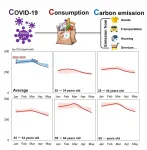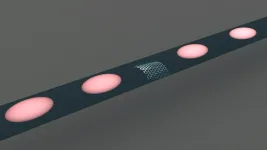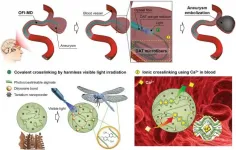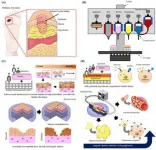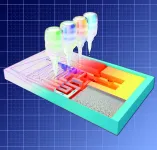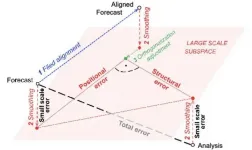(Press-News.org) Despite the rapid and significant changes in consumption patterns witnessed during the initial months of the COVID-19 pandemic, Japanese households maintained their normal levels of greenhouse gases emissions. The "anthropause" -- reduction of human activity due to the pandemic -- made headlines last summer, but factory shutdowns and broken global supply chains did not translate into the adoption of eco-friendly lifestyles for the average household.
"During the early COVID-19 period, we could witness lifestyle changes happening around us fast, so we decided to explore the environmental impacts of these lifestyle changes. Some other research at that period was showing that the production-side greenhouse gases emissions decreased, but when assessing the emissions from the consumer side we noticed that they did not change so much compared to 2015 through 2019 levels," said Project Assistant Professor Yin Long from the University of Tokyo Institute for Future Initiatives. Long is first author of the research recently published in One Earth.
Experts say that around the world, half of a nation's carbon footprint is due to the consumption of goods and services by individual households. A carbon footprint is a measure of both the direct and indirect greenhouse gases emissions associated with growing, manufacturing and transporting the food, goods, utilities and services we use.
Researchers considered in this study approximately 500 consumption items and then tracked the carbon emissions embedded in all the associated goods and services. Eating out, groceries, clothing, electronics, entertainment, gasoline for vehicles, as well as home utilities were all included.
"The real beauty of it is the consistency of the long-term data collection in these government statistics, even during the COVID-19 period, which allows us to compare it with historical patterns" said Associate Professor Alexandros Gasparatos, an expert on ecological economics who led the study. Gasparatos holds a dual appointment with the University of Tokyo and the United Nations University in Tokyo.
The monthly carbon footprints of household consumption for the period January to May of 2020 were compared to the carbon footprints of the same months from the previous five years. In Japan, COVID-19 diagnoses began increasing in February and the first nationwide COVID-19 state of emergency was declared from mid-April to mid-May 2020.
The research team's analyses revealed that the 2020 carbon footprint of all households, both aggregate and across different age groups, largely remained within the range of 2015 through 2019.
The carbon footprint of the emissions associated with eating out decreased during the state of emergency, but emissions from groceries increased, especially due to the purchase of more meat, eggs and dairy. Emissions associated with clothing and entertainment decreased sharply during the state of emergency, but rebounded rapidly when the emergency measure ended.
"This kind of natural experiment is telling us that the very quick and consistent change in lifestyle during the early stages of the COVID-19 pandemic did not materialize into significant and sustained changes in the carbon footprints of households," said Gasparatos.
The nonbinding state of emergency declarations by the national and local governments in Japan requested that people limit social gatherings, dining out in groups and nonessential travel between prefectures. Compared to the legally enforced lockdowns in other countries, researchers say Japan's minimal impositions are likely a better model of the lifestyle changes that eco-conscious households might make voluntarily.
"If we see lifestyle change as a strategy to achieve decarbonization, our results suggest that it might not automatically translate into environmental benefits. It will require a lot of effort and public education focused on the most emission-intensive household demands, such as private car use, and space and water heating," said Gasparatos.
"We saw that factories shut down when COVID-19 happened, but consumer demand stayed the same, so factories reopened to satisfy those demands. As written in the United Nations Sustainable Development Goals, consumers and producers should share responsibility for achieving sustainable lifestyles," said Long.
INFORMATION:
Research Article
Yin Long, Dabo Guan, Keiichiro Kanemoto, and Alexandros Gasparatos.15 April 2021. Negligible impacts of early COVID-19 confinement on household carbon footprints in Japan. One Earth. DOI: 10.1016/j.oneear.2021.03.003
https://doi.org/10.1016/j.oneear.2021.03.003
Related Links
Gasparatos Lab: http://www.gasparatos-lab.org/
Institute for Future Initiatives (IFI): https://ifi.u-tokyo.ac.jp/
Research Contact
Professor Alexandros Gasparatos
Institute for Future Initiatives (IFI), University of Tokyo, 7-3-1 Hongo, Bunkyo-ku, Tokyo 113-8654, Japan
Institute for the Advanced Study of Sustainability, United Nations University, 5-53-70 Jingumae, Shibuya-ku, Tokyo 150-8925, Japan
Tel:
Email: gasparatos@ifi.u-tokyo.ac.jp
Press Officer Contact
Ms. Caitlin Devor
Division for Strategic Public Relations, The University of Tokyo, 7-3-1 Hongo, Bunkyo-ku, Tokyo 133-8654, JAPAN
Tel: +81-080-9707-8178
Email: press-releases.adm@gs.mail.u-tokyo.ac.jp
Funders
Japan Science and Technology Agency, Japan Society for the Promotion of Science
The promise of a quantum internet depends on the complexities of harnessing light to transmit quantum information over fiber optic networks. A potential step forward was reported today by researchers in Sweden who developed integrated chips that can generate light particles on demand and without the need for extreme refrigeration.
Quantum computing today relies on states of matter, that is, electrons which carry qubits of information to perform multiple calculations simultaneously, in a fraction of the time it takes with classical computing.
The co-author of the research, Val Zwiller, Professor ...
Cerebral aneurysms are malformations caused by abnormalities on the walls of blood vessels in the brain. When these blood vessels rupture, about 30% of the sufferers die on the spot, giving these the rightful label of 'ticking bombs in the head'. Recently, a research team at POSTECH has come up with a new treatment that can disassemble these time bombs by filling the aneurysm in blood with a new method.
In order to overcome the shortcomings of coil embolization, POSTECH's joint research team (Professor Joonwon Kim and Dr. Jongkyeong Lim of the Department of Mechanical Engineering with Professor ...
The skin, which covers the surface of the human body, is its largest organ. It is the first organ to show changes stemming from organ or physiological activity. It is especially common for diabetic patients to suffer from skin diseases or infections. Recently, a POSTECH research team has succeeded in creating a 3D artificial skin that enables observation of skin diseases of diabetic patients.
A research team led by Professor Dong-Woo Cho and Minjun Ahn of POSTECH's Department of Mechanical Engineering and Professor Byoung Soo Kim of School of Biomedical Convergence Engineering at Pusan National University has ...
A decade already passed from the first use of bioresorbable vascular scaffold in percutaneous coronary interventions. The first studies - by using surrogate endpoints - showed some superiority of BRS vs. metallic drug-eluting stent in terms of the so-called vascular restoration therapy with recovery of vasomotion and vascular pulsatility when the scaffold was absorbed.
Nevertheless, after these first promising findings, larger and randomized clinical trials and subsequent meta-analyses, powered to hard clinical endpoints, showed that bioresorbable vascular scaffolds, made ...
Researchers at KU Leuven (Belgium) have developed a 3D printing technique that extends the possibilities of lateral flow testing. These tests are widespread in the form of the classic pregnancy test and the COVID-19 self-tests. With the new printing technique, advanced diagnostic tests can be produced that are quick, cheap, and easy to use.
The COVID-19 pandemic has made everyone aware of the importance of rapid diagnosis. The sale of self-tests in pharmacies has been permitted in Belgium since the end of March. This self-test is a so-called lateral flow test. Using a ...
Analysis of The Autopsy, Toxicological, and Psychiatric Reports of Portugal's First Major Forensic Case: Part III
https://doi.org/10.1080/20961790.2021.1898079
Announcing a new article publication for Forensic Sciences Research journal. In this review article the author Ricardo Jorge Dinis-Oliveira of the University Institute of Health Sciences (IUCS)-CESPU, Gandra, Portugal continues a three-part investigation of the "Crime of Flores Street" one of the most famous cases of poisoning which occurred in Portugal in the late 19th century. The case demonstrated the weaknesses of the Portuguese medicolegal system and attests to the importance of toxicological analysis. The first article ...
Most people who are infected with SARS-CoV-2 develop no or only mild symptoms. However, some patients suffer severe life-threatening cases of COVID-19 and require intensive medical care and a ventilator to help them breathe. Many of these patients eventually succumb to the disease or suffer significant long-term health consequences. To identify and treat these patients at an early stage, a kind of "measuring stick" is needed - predictive biomarkers that can recognize those who are at risk of developing severe COVID-19.
First biomarker to predict severity of disease
A team led by Professor Burkhard Becher at the Institute of Experimental Immunology at the University of Zurich, working with researchers from Tübingen, Toulouse and Nantes, has now discovered such ...
Due to the chaotic nature of the atmosphere, weather forecasts, even with ever improving numerical weather prediction models, eventually lose all skill. Meteorologists have a strong desire to better understand this process as they try to trace forecast error back to observational gaps and to provide a means for improvement.
Root mean square error (rms, or its square, the variance distance) is often used to measure differences between simulated and observed fields. In this case, scientists measured the distance between a model forecast field within its grid and the verifying analysis field ...
A pioneering study by UCL scientists has discovered the presence of a harmful inflammatory protein in patients with symptomatic tuberculosis (TB).
Researchers say, by targeting the IL-17 cytokine, a component produced naturally by the immune system in response to infection, excessive and damaging lung inflammation caused by TB may be significantly reduced to help speed up patient recovery.
TB is an infection caused by the bacterium Mycobacterium tuberculosis and is the leading cause of death from infections worldwide. The World Health Organisation estimates that 1.4 million people died of TB disease worldwide in 2019.
Explaining the experimental study, lead author Dr Gabriele Pollara (UCL Division of Infection & Immunity), ...
In a time of a global crisis such as the ongoing COVID-19 pandemic, it is easy to note how people move through different phases to buckle up for such unprecedented and arduous times.
In the very beginning of the pandemic last year, we observed "an epidemic of fear", where it was all about the calamitous nature of a totally unknown virus and its worrying contagiousness and mortality rate. A few months later, with lockdown and restrictions already in place across the world, the fear was replaced by "an epidemic of explanations", where people even in their naivety, started to seek a sense of comfort by ...
